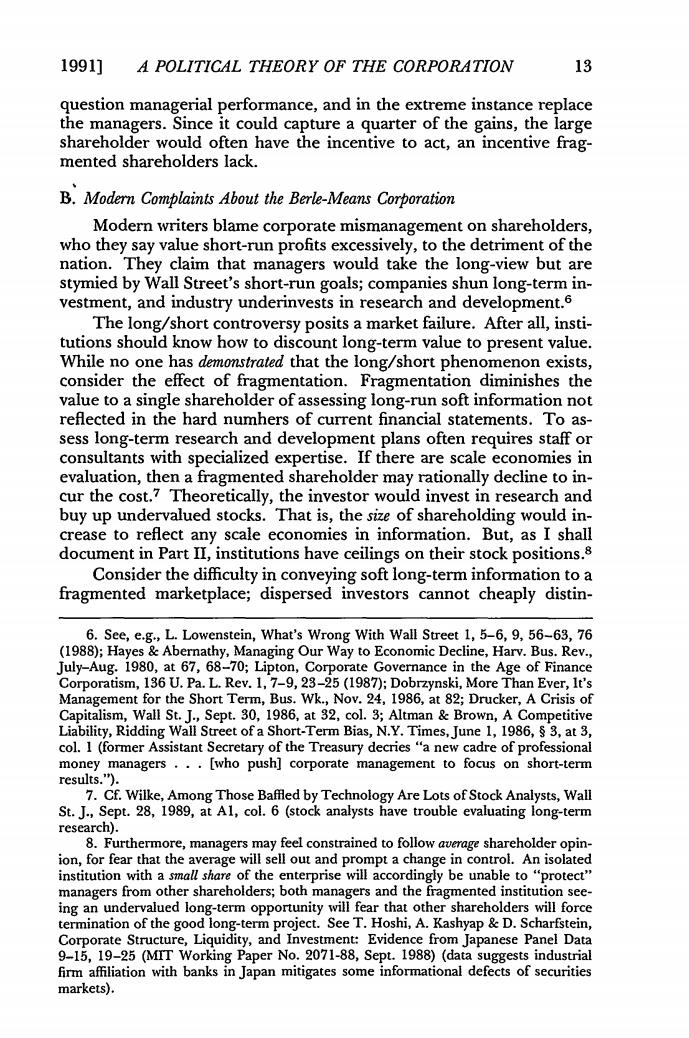正在加载图片...

19911 A POLITICAL THEORY OF THE CORPORATION 13 question managerial performance,and in the extreme instance replace the managers.Since it could capture a quarter of the gains,the large shareholder would often have the incentive to act,an incentive frag- mented shareholders lack. B.Modern Complaints About the Berle-Means Corporation oder witers blaent on sharehoders who they say va sh ly,to the deriment of nation. They claim that managers would take the long-view but are stymied by Wall Street's short-run goals;companies shun long-term in- vestment,and industry underinvests in research and development.6 The lon ng/short co ntroversy posits a market failure.After all,insti- tutions should know how to d long-term value to present value While no one has demonstrated that the long/short phenomenon exists, consider the effect of fragmentation.Fragmentation diminishes the value to a single shareholder of assessing long-run soft information not reflected in the hard numhers of current financial statements.To as- sess long-term research nd devel s often equ res st consultants with specialized expertis f there are sca economies in evaluation,then a fragmented shareholder may rationally decline to in- cur the cost.?Theoretically,the investor would invest in research and buy up undervalued stocks.That is,the size of shareholding would in- crease to reflect any scale economies in information.But.as I shall document in Part I,institutions have ceilings on their stock positions. Consider the difficulty in conveying soft long-term information to a fragmented marketplace;dispersed investors cannot cheaply distin- e,e.gAb Whar's Wr g With Wall St ,5-6,9,56-63 76 1881 Ha 1yAug.1980,at67,68-70,L in the of Fina Corporatism,136 U.Pa.L.Rev.1,7-9,23-25(1987);Dobrzynski,More Than Ever,It's Ma gement fo the Short Term,E Wk. 4.1986,at 82;Drucker,A Crisis of Wall S ept.5 986 colRid at32 6, of the de of managers [who push]c orate ma agement to focus on short-term results."). 5ed byTenology AreLot onaly Wall ng ong-tem 8.Furthermore,managers may feel constrained to follow average shareholder opin ion,for fear that the average will sell out and prompt a change in control.An isolated institution with a har of the enterprise will ac ingly be una protect managers fom e gation of the go priect.SceT.Hoshi,A.Kashy p&D.Scharfstein Co orate Structure,Liquidity,and Investment:Evidence from Japanese Panel Dat 9-15,19-250M Working Paper No.)(da firm af liation with banks in Japan mitigates some lefects o markets 1991] A POLITICAL THEORY OF THE CORPORATION 13 question managerial performance, and in the extreme instance replace the managers. Since it could capture a quarter of the gains, the large shareholder would often have the incentive to act, an incentive fragmented shareholders lack. B. Modern Complaints About the Berle-Means Corporation Modem writers blame corporate mismanagement on shareholders, who they say value short-run profits excessively, to the detriment of the nation. They claim that managers would take the long-view but are stymied by Wall Street's short-run goals; companies shun long-term investment, and industry underinvests in research and development. 6 The long/short controversy posits a market failure. After all, institutions should know how to discount long-term value to present value. While no one has demonstrated that the long/short phenomenon exists, consider the effect of fragmentation. Fragmentation diminishes the value to a single shareholder of assessing long-run soft information not reflected in the hard numbers of current financial statements. To assess long-term research and development plans often requires staff or consultants with specialized expertise. If there are scale economies in evaluation, then a fragmented shareholder may rationally decline to incur the cost. 7 Theoretically, the investor would invest in research and buy up undervalued stocks. That is, the size of shareholding would increase to reflect any scale economies in information. But, as I shall document in Part II, institutions have ceilings on their stock positions. 8 Consider the difficulty in conveying soft long-term information to a fragmented marketplace; dispersed investors cannot cheaply distin- 6. See, e.g., L. Lowenstein, What's Wrong With Wall Street 1, 5-6, 9, 56-63, 76 (1988); Hayes & Abernathy, Managing Our Way to Economic Decline, Harv. Bus. Rev., July-Aug. 1980, at 67, 68-70; Lipton, Corporate Governance in the Age of Finance Corporatism, 136 U. Pa. L. Rev. 1, 7-9, 23-25 (1987); Dobrzynski, More Than Ever, It's Management for the Short Term, Bus. Wk., Nov. 24, 1986, at 82; Drucker, A Crisis of Capitalism, Wall St. J., Sept. 30, 1986, at 32, col. 3; Altman & Brown, A Competitive Liability, Ridding Wall Street of a Short-Term Bias, N.Y. Times, June 1, 1986, § 3, at 3, col. 1 (former Assistant Secretary of the Treasury decries "a new cadre of professional money managers . . . [who push] corporate management to focus on short-term results."). 7. Cf. Wilke, Among Those Baffled by Technology Are Lots of Stock Analysts, Wall St. J., Sept. 28, 1989, at Al, col. 6 (stock analysts have trouble evaluating long-term research). 8. Furthermore, managers may feel constrained to follow average shareholder opinion, for fear that the average will sell out and prompt a change in control. An isolated institution with a small share of the enterprise will accordingly be unable to "protect" managers from other shareholders; both managers and the fragmented institution seeing an undervalued long-term opportunity will fear that other shareholders will force termination of the good long-term project. See T. Hoshi, A. Kashyap & D. Scharfstein, Corporate Structure, Liquidity, and Investment: Evidence from Japanese Panel Data 9-15, 19-25 (MIT Working Paper No. 2071-88, Sept. 1988) (data suggests industrial firm affiliation with banks in Japan mitigates some informational defects of securities markets)